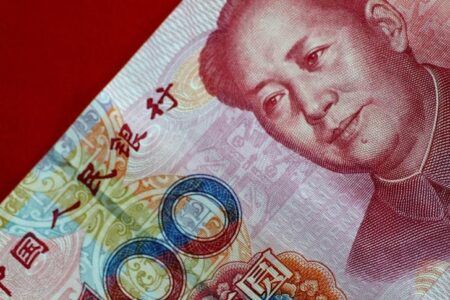By Rishav Chatterjee
(Reuters) – Short bets on most Asian currencies eased marginally but remained firmly in the bearish territory, a Reuters poll found on Thursday, as diminishing hopes of an early U.S. interest rate cut kept the dollar buoyant and market volatility in regional powerhouse China dampened investor confidence.
Bearish bets on the South Korean won, Indonesian rupiah and the Taiwan dollar ticked lower, while those on the Chinese yuan and Singapore dollar edged higher, according to a fortnightly poll of 10 respondents.
The U.S. dollar, which measures itself against a basket of currencies, jumped to a near three-month high this week as investors slashed bets that the Federal Reserve would begin cutting interest rates as early as March. [FEDWATCH] [USD/]
“The U.S. Federal Reserve appears to be in no hurry to cut rates, disappointing markets, but given the recent rally, it would require a number of adverse developments for the Fed to move expeditiously,” said DBS analysts.
Robust economic data from the United States, including the closely watched jobs report, which exceeded market expectations, reinforced the view that a rate cut in March was highly unlikely.
Meanwhile, a slew of disappointing economic data from Asia’s largest economy China, such as inflation, services and manufacturing activity, coupled with volatility in equities, kept analysts unmoved on their bearish views on the region’s currencies.
Short bets on the yuan now stand at their highest level since mid-November last year.
“The sentiment around the Chinese yuan will more likely be dependent on any new policy announcements aimed at supporting Chinese stock markets ahead of Lunar New Year,” said Wei Liang Chang, FX & credit strategist at DBS Group (OTC:).
Short positions on the Thai baht and Philippine peso eased as well.
Thailand’s central bank kept the country’s key interest rate unchanged on Wednesday, defying government pressures to cut down on borrowing costs to revive faltering growth.
“While acknowledging the downside risks to the outlook, we continue to expect the Bank of Thailand to keep its policy rate steady for the whole duration of 2024,” Aris Dacanay, an analyst at HSBC wrote in a note.
Meanwhile, the Indian rupee was the outlier among the pack, with investors maintaining their bullish views on the currency, which has outperformed its peers so far this year.
“Of late, INR has seen a bit of a boost from global fund buying and an improvement to the trade deficit,” analysts at Maybank wrote.
The Indian rupee has gained 0.3% so far this year, the only currency in the region in the positive territory.
“Our medium-term INR view remains largely positive as we see growth and inflation dynamics remaining supportive for the INR,” Maybank added.
The Asian currency positioning poll is focused on what analysts and fund managers believe are the current market positions in nine Asian emerging market currencies: the Chinese yuan, South Korean won, Singapore dollar, Indonesian rupiah, Taiwan dollar, Indian rupee, Philippine peso, Malaysian ringgit and the Thai baht.
The poll uses estimates of net long or short positions on a scale of minus 3 to plus 3. A score of plus 3 indicates the market is significantly long U.S. dollars.
The figures include positions held through non-deliverable forwards (NDFs).
The survey findings are provided below (positions in U.S. dollar versus each currency):
DATE
8-Feb-24 0.4 0.39 0.41 0.4 0.32 -0.17 1.07 0.28 0.72
25-Jan-24 0.37 0.9 0.28 0.51 0.49 -0.18 1.07 0.5 0.9
11-Jan-24 0.18 0.3 0.02 0.19 0.05 -0.15 0.72 0.09 0.03
14-Dec-23 0.02 -0.09 -0.22 -0.05 -0.33 0.34 0.58 -0.22 0.16
30-Nov-23 0.12 -0.05 -0.07 -0.05 -0.13 0.63 0.73 -0.1 -0.1
16-Nov-23 0.77 0.49 0.38 0.77 0.63 0.82 1.14 0.38 0.28
2-Nov-23 1.32 1.18 0.74 1.44 1.31 1.35 1.33 0.96 0.85
19-Oct-23 1.02 1.16 0.84 1.06 1.06 1.21 0.78 0.89 0.67
5-Oct-23 1.17 1.25 0.81 1 1.25 0.92 1.08 0.75 1.03
Read the full article here












